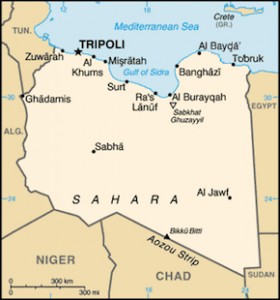Among the many growing concerns about the transition to post-Gadhafi Libya are fears of widespread disease, as dead bodies pile up in the streets and shortages of medicine, water, fuel and food persist. 
The scale of the fighting in Libya has reduced, but the bodies keep accumulating – civilians caught up in the crossfire; fighters from both sides killed in action; those black men summarily executed by the rebels for being alleged mercenaries, and political prisoners by the regime.
Bloated corpses infested with maggots and decomposing in the heat have become such a danger to health that removing them has become an urgent priority of the Tripoli council, which has now been officially inaugurated. Still, progress is very slow and hasn’t gone much beyond public statements of “immediate action.”
Humanitarian assistance from various governmental and non-governmental organizations is set to arrive soon, but the need is substantial considering the shortages of basic necessities, lack of medical attention to the wounded, overcrowded hospitals and prisons, and the still rising refugee problem.





a disease has been attacking them for 6 months